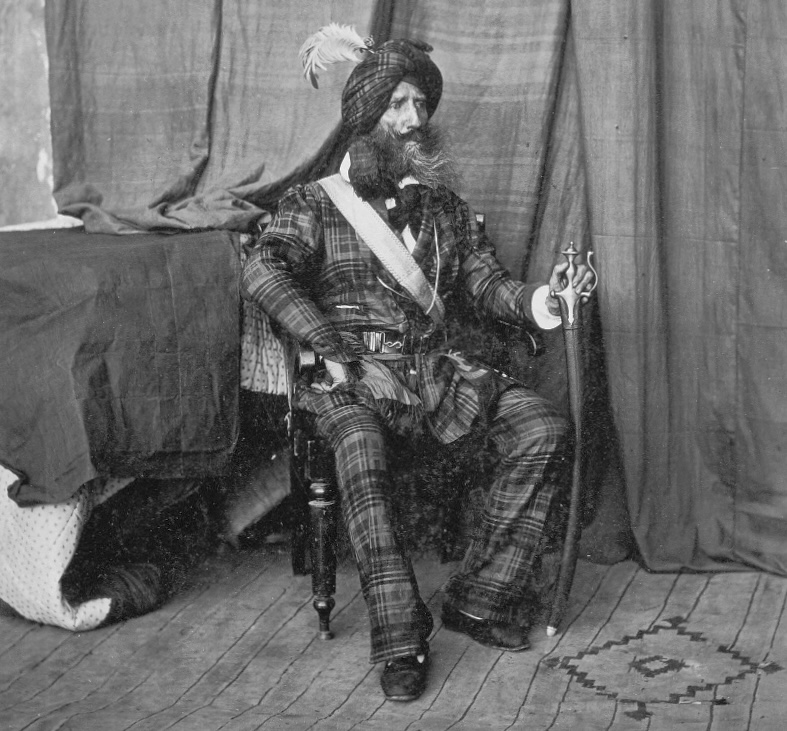Needham Question
Why some communities and nations stay undeveloped, while others race ahead.
Keywords:
Informed
Golden Age
Entrepreneur
Mar 11, 2024

Colonel Alexander Gardner was born in Wisconsin, USA.
He served as Colonel in the Sikh army of Maharaja Ranjit Singh.
Needham question is a profound question. Why some communities and nations stay undeveloped, while others race ahead.
Why Americans and Europeans served in armies of Sikh Empire in 1800's. But today Sikhs serve in armies of America and Europe.
Joseph Needham was a British biochemist who also wrote about Chinese Science and Technology.
He was one of the founders of UNESCO(United Nations Educational, Scientific, and Cultural Organization.
He was married to
Lu Gwei-djen, a Chinese biochemist and historian.
Together they wrote the multi-volume book '
Science and Civilisation in China'.
Needham's question is a question of profound importance. He asks:
"
Why did modern science, the mathematization of hypotheses about Nature, with all its implications for advanced technology, take its meteoric rise only in the West at the time of Galileo?, and why it had not developed in Chinese civilization which in the previous many centuries was much more efficient than occidental in applying natural knowledge to practical needs?"
"
Francis Bacon had selected four inventions, paper and printing, gunpowder, and the magnetic compass, which had done more than (anything else), he thought, to transform completely the modern world and mark it off from the antiquity of the Middle Ages. He regarded the origins of these inventions as ‘obscure and inglorious’ and he died without ever knowing that all of them were Chinese".
So why did the Chinese inspite of inventing these transformative technologies, were not able to use them at scale to transform China and the world?
Why was it the Europeans that did it much later?
This is the Needham question.
Nathan Sivin, one of Needham's collaborators rephrased it as 'counterfactual hypothesis': "
It is analogous to the question of why your name did not appear on page 3 of today's newspaper".
It helps us understand why inspite of having ideas and technologies, some communities and nations stay undeveloped, while others race ahead.

Gross domestic product (at purchasing power parity) per capita between 1500 and 1950 in 1990 International Dollars for selected nations.
Science without development
David S. Landes, Emeritus Professor of Economics, Harvard University,
writes:
"
the Chinese had a power-driven spinning machine in the thirteenth century, some 500 years before the England of the Industrial Revolution knew water frames and mules; or in iron manufacture, where the Chinese early learned to use coal and probably coke (as against charcoal) in blast furnaces for smelting iron and were turning out perhaps as many as 125,000 tons of pig iron by the later eleventh century—a figure not achieved by Britain until 700 years later (Elvin, 1973, p. 85).2 In general, one can establish a long list of instances of Chinese priority: the wheelbarrow, the stirrup, the rigid horse collar (to prevent choking), the compass, paper, printing, gunpowder, porcelain".
Chinese had scientific discoveries but these did not bring about transformation of China or the world.
"The mystery lies in the failure of China to realize the potential of some of the most important of these inventions".
Answering the Needham Question
There are several hypothesis proposed to answer the Needham question.
High-level equilibrium trap: people became satisfied very quickly with what they had. Supply-demand were balanced. However, the world was changing and would pull the ground from beneath their feet.
The lesson here is even though we can live a comfortable life today, we have to evolve otherwise we will be made irrelevant by the flood of changes.
Arbitrary laws and totalitarian control: China had an emperor that exerted totalitarian control. Independent states had limited control. People's property could be confiscated anytime for any reason. This took away people's motivation to succeed.
"
the Chinese would no doubt have enriched China further and probably brought it to the threshold of modern industry, had it not been for this stifling state control. It is the State that kills technological progress in China".
Lack of free market prevented inventors and entrepreneurs from bringing their product to the market to make money sand change people's lives. But they would not do it as they will only see their profits confiscated.
"
Any man of genius is paralyzed immediately by the thought that his efforts will win him punishment rather than rewards".
"
Chinese state was always stepping in to interfere with private enterprise—to take over certain activities, to prohibit and inhibit others, to manipulate prices, to exact bribes."
Shift from Taoism to Confucianism among the intelligentsia: Taoism was an older philosophy that focused on exploring science and mathematics. Confucianism was a later philosophy that focused on social philosophy and morality. This led to a change in people's thinking and culture.
Lessons for today is to
focus on science and economics as they are the 2 powerful forces driving the world. Philosophy and morality is important but secondary. Our philosophical beliefs and priorities contribute to our success.
Over-emphasis on experience: China did not move from an "
experience-based technological invention process to an experiment-based innovation process".
Experience-based technological invention process is slow and only accessible to a few people.
Experiment-based innovation process can be accessed by all, and can create better quality products at a faster pace.
Fossilized institutions: "
Lin blamed the institutions in China for preventing the adoption of the experiment-based methodology. Its sociopolitical institution inhibited intellectual creativity, but more importantly, it diverted this creativity away from scientific endeavours". Institutions can be good or bad. They are not a magic bullet.
Downward tyranny: Chinese bureaucrats had
false pride and narcissism. They would tyrannize their subordinates. This structure made powerful people '
bad learners'.
Omnipotent bureaucracy: "
the omnipotence of the bureaucracy, goes much farther. There are clothing regulations, a regulation of public and private construction (dimensions of houses); the colors one wears, the music one hears, the festivals—all are regulated. There are rules for birth and rules for death; the providential State watches minutely over every step of its subjects, from cradle to grave. It is a regime of paper work and harassment, endless paper work and endless harassment".
Government busybodies with nothing to do except keeping an eye on people and fine them for one of several minor offenses. We increasingly see this in the western world.
Medieval China, and many Western countries now are a 'fine' country, with a fine for everything you do.
Restricting foreign trade: "
Foreign trade is a great source of foreign knowledge as well as the capability of acquisition of new products. Foreign trade promotes innovation as well as the expansion of a countries market".
Cultural factors
David S. Landes, Emeritus Professor of Economics, Harvard University,
writes: "
Why this peculiarly European joy in discovery? This pleasure in the new and better? This cultivation of invention".
"
One possible reason grows from the Judaeo-Christian respect for manual labor, summed up in a number of biblical injunctions. One example will suffice: when God warns Noah of the coming flood and tells him he will be saved, it is not God who saves him. “Build thee an ark of gopher wood,” says the Lord, and Noah builds an ark to divine specifications".
The key point here is religion and culture
taught people to act in response to a crisis. Religion and culture
did not promise magical solutions.
"
A third reason stems from the Judaeo-Christian sense of linear time. Other societies thought of time as cyclical, returning to earlier stages and starting over again".
Judaeo-Christian belief is that Time is linear, things can get better or worse. It is up to us to make the best of it. There is no guarantee of good or bad times returning as part of some cycle.
* * *
"
The history of Chinese advances, then, is one of points of light, separated in space and time, unlinked by replication and testing, obfuscated by metaphor and pseudo-profundity, limited in diffusion".
Chinese made great inventions, but they just became a flash in the dark. They were not allowed to grow, develop, scale, diffuse, bring to market.
Mixture of cultural factors, Chinese state and bureaucracy kept China in a state of happy equilibrium. Meanwhile, the world evolved but China did not. They were soon run over. A
century of humiliation followed.
Great ideas and inventions are fragile things. They need to be nurtured in the right environment. It is a popular fallacy that great ideas and inventions break through on their merit. They need a lot of help and support.
The help, support and environment that communities, institutions and Intelligentsia provide to fragile ideas is what determines their future. This determines whether others come to serve them and learn from them, or whether they are uprooted and go far to serve and learn from the winners.
China made this mistake,
so did Japan, and the Sikhs still do it.
The book Loonshots also talks of this: "
The Chinese and Mughal emperors discovered the same lesson that surprised so many of their industrial descendants centuries later: missing loonshots can be fatal".
Nurturing loonshots(crazy ideas) matters.
Why nurture a project or idea so impossible, only a fool(loon) will attempt it?
It is because such crazy ideas gave us gunpowder, magnetic compass, paper, radar, radar bomb, anti-cholesterol drug statins, mobile phones, app stores and more.
It is not just products, but business and military strategies thought impossible loonshots that changed the world.
Seemingly impossible ideas once implemented can transform a business, culture, region, military, war, people's lives, and history.
Similarly, ignoring seemingly impossible ideas can send people, regions, cultures, nations, armies, and kingdoms to the backwaters of history.
"
He who does not go forward will go backward. The saying was apparently as much observation as prescription".

Sikh Heritage month to remember Sikhs who served in Western armies.

Sikh Heritage month to remember Sikhs who served in Western armies.
Related articles
Loonshots: How to Nurture the Crazy Ideas That Win Wars, Cure Diseases, and Transform Industries
Can Asians Think? Understanding the Divide Between East and West
External Links


